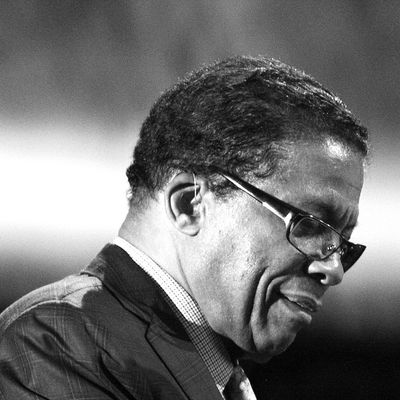
Jazz icon Herbie Hancock has had a long, trailblazing career, from his classic work with Miles Davis in the ‘60s through his wildly popular funk and hip-hop excursions in the ‘70s and ‘80s, and into his current guise as one of the genre’s preeminent experimenters and popularizers. But despite a habit of musical mold-breaking, the keyboardist has fallen prey to some all-too-common show-business demons. In this excerpt from his memoir, Herbie Hancock: Possibilities (Viking), out October 23, Hancock, 74, shares his first experience with the drug, crack, that would take him years to overcome.
One night I drove to a friend’s place in Beverly Hills for a birthday party, and as I was parking I saw two women I knew getting into their cars. “Are you leaving?” I asked.
“Yeah,” one of them said. “You might not want to go up there.” Before I could ask what she meant, the car started up and they were gone.
I decided to head in and see what was happening. When I walked into the apartment, I didn’t see my friend and didn’t know most of the people there. They were mostly standing around, talking and drinking, but there was also cocaine on the coffee table. I got myself a drink, and after a while I noticed that people were coming in and out of one of the bedrooms. It seemed like they were trying to hide whatever was going on back there, but when they came out of that room, I could see that they were high.
Somebody finally asked me, “Have you ever smoked cocaine?” “Nooo,” I said. “I’m afraid to do anything like that.” For me, there was a clear line between snorting cocaine and smoking it. Crack cocaine was a relatively new drug, but to my mind it fell on the same side of the line as heroin, which I would never touch. I knew what heroin had done to musicians like Charlie Parker, Chet Baker, and John Coltrane in his early years. It wasn’t a drug you could take recreationally; it was a drug that took over your life, and that was my impression of crack, too.
As the party went on, though, I found myself getting more and more curious. What is this thing that people are talking about that’s so bad? Crack was a cocaine derivative, and I didn’t have a problem with cocaine. What was so different about this drug? After a while I couldn’t contain my curiosity. “Hey, I changed my mind,” I said. “I want to try it.”
My friend asked, “Herbie, are you sure you want to do this? It may not be a good idea.” Then someone else standing nearby said, “It’s all right! Let him try it.”
I said, “I want to see.” So I was led down the hallway into the bedroom, where somebody put a pipe in my mouth and lit it. “Draw it in and hold it,” the person told me. I did. And when the high hit me, it was like nothing I’d ever felt. Crack overloads the pleasure center of your brain, hitting you with a wave of every pleasurable sensation you can imagine, physical and emotional, all at once. I closed my eyes and thought, Oh, shit. I should never have done this. This stuff was obviously way too dangerous to mess with.
I decided that night that this would be the last time I ever smoked crack. Unfortunately that resolution lasted only about a month before I picked up the pipe again.
For a while I managed to smoke only once every couple of months or so, and every time I did, I swore it would be the last. I made rules for myself: I’d never do it on tour, or when my family was around. And I never told Gigi — never told anybody, in fact, except the very few people I actually smoked with. I was super paranoid about being found out and having my career, and maybe my life, ruined.
But I just could not stop doing it, even though months would go by between sessions. I was sure I’d be able to quit at some point, but I had no idea how far in the future that might be. In the meantime, I guarded my secret and tried to keep things under control. As time went on, that would become more difficult to do.
From HERBIE HANCOCK: Possibilities by Herbie Hancock with Lisa Dickey. Reprinted by arrangement with Viking, a member of Penguin Group (USA) LLC, A Penguin Random House Company. Copyright © Herbie Hancock, 2014.




